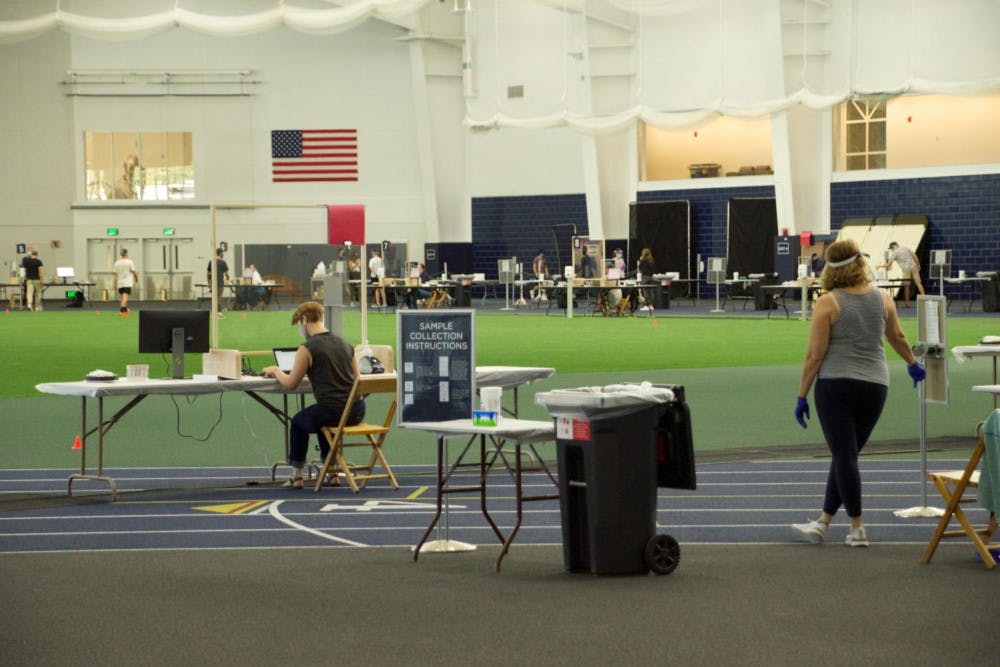Daniel Celik’s official title is custodial supervisor, but he recently took on the temporary position as the operations coordinator for the Covid Operations Team — joining a cohort of staff and student-workers taking on new responsibilities amid the pandemic. A typical week for Celik includes working at the testing center Mondays and Thursdays, communicating with students who need to move into isolation or quarantine (ISO/Q) housing on Tuesdays and Fridays and working on logistics each Wednesday.
“The pandemic really is in control of the position as it is constantly adapting to the changes with current virus spread, state and federal mandates and how we as a campus act,” Celik said in an email to The Campus.
Celik is typically the second person students speak to after the health center contacts them about moving into quarantine. He helps them work out the logistics of their move into isolation or quarantine housing, including setting up transportation, providing information about the move and what resources are available in their building, checking in with students via email and helping students figure out the logistics of their departure.
“This may sound cliché, but I think of [students] as my own to look after, help and guide through this process,” Celik said.
Affectionately, he’s also known as “the Covid supply guy,” because part of his job is procuring cleaning supplies for the whole campus. He took on this responsibility in June 2020 and kept the job as part of his new position. Celik is responsible for providing the hand sanitizer, disinfectant wipes, cleaning kit supplies and PPE seen all around campus.
Megyn Pitner, a catering manager, also saw a change in her work amid the pandemic, now working as part of the Covid Response Team, which provides meals and other services for students in quarantine and isolation housing.
Pitner said that she was glad to accept a larger role in Covid-19 safety this semester — and that a key part of the group’s success is the makeup of the team, which includes representatives from many of the departments that provide ground-level services.
“In these times we do what needs to be done,” Pitner said in an email to The Campus. “We’ve worked hard to identify needs, and then the most appropriate people to take care of the task step up and make it happen.”
Her work has taken her all over campus and included tasks such as dealing with scheduling emergencies, onboarding dining support and working in the dishroom.
Pitner tracks the number of students in isolation and quarantine each day and coordinates delivery of meals with other members of the Covid Response Team. She also has coordinated the preparation and delivery of meals during the fall and spring arrival quarantines.
“It really feels good to be part of the team that is so critical to the success of the college being a safe place for students and staff to be this semester,” Pitner said. “The great teamwork that has been required to make all of this happen has been inspiring and encouraging and helps me feel really good about working as hard as we all do.”
Custodial Services have also played an integral role in the college’s Covid-19 response. Kerry McGown, a custodial supervisor, said staff members are now providing service 24/7 to reduce close contacts with other staff and students. Custodial staff on the Covid Response Team clean, disinfect and maintain spaces for quarantined and isolated students.
“Things have changed a whole lot, but our ability to work as a team has remained the same,” McGown said. “I hope the students know how much we appreciate them being here — it was awfully quiet without them.”
Liv Mulloy ’23 is a line monitor working primarily in Atwater, where she manages lines during meals for a couple hours every shift. Mulloy’s job includes directing students in line, limiting the number of people in the general service area and sanitizing tables to keep them clean.
The three goals of the position are to instruct students to sanitize their hands before entering the dining hall, to stay six feet apart and to keep their masks on, according to Ariel Silver ’22, a line monitor working mostly in Proctor. He and Mulloy spoke about the challenges of following the rules — especially as the semester progresses and the prevalence of Covid-19 on campus appears low — but stressed how important it is to stay careful and safe.
“One of the things I regret about the job is that it seems like a policing job, like you’re trying to be a disciplinarian, which is not something that I at all enjoy,” Silver said. “It doesn’t have to be that way. We were told in the training that it’s mostly about friendly reminders in case something risky is going on in terms of Covid protocol.”
Mulloy and Silver both said the social aspect of the job and interacting with dining hall staff were highlights of their work. As a line monitor, Mulloy socializes with approximately 500 students who she sees each shift. Mulloy said she appreciates when students tell her about their days after she greets them.
“If you socialize with students, then they’re more inclined to listen if you have to ask them to stay six feet apart,” Mulloy said. “It's easy to be vocal if you’re already super chatty with them.”
“One of the best parts of the job is getting to know the people who work there and feed you,” Silver said. “I feel like so many of us take it for granted that there are people who work for very low pay who are feeding us."

Julia Pepper '24 (she/her) is the Senior Local Editor.
She previously served as a Local Editor. She is a Psychology major and French minor. This past spring she studied in Paris. She spent the summer interning at home in New York City, putting her journalistic cold calling skills to use at her internship doing outreach with senior citizens. In her free time she enjoys reading and petting cats.




